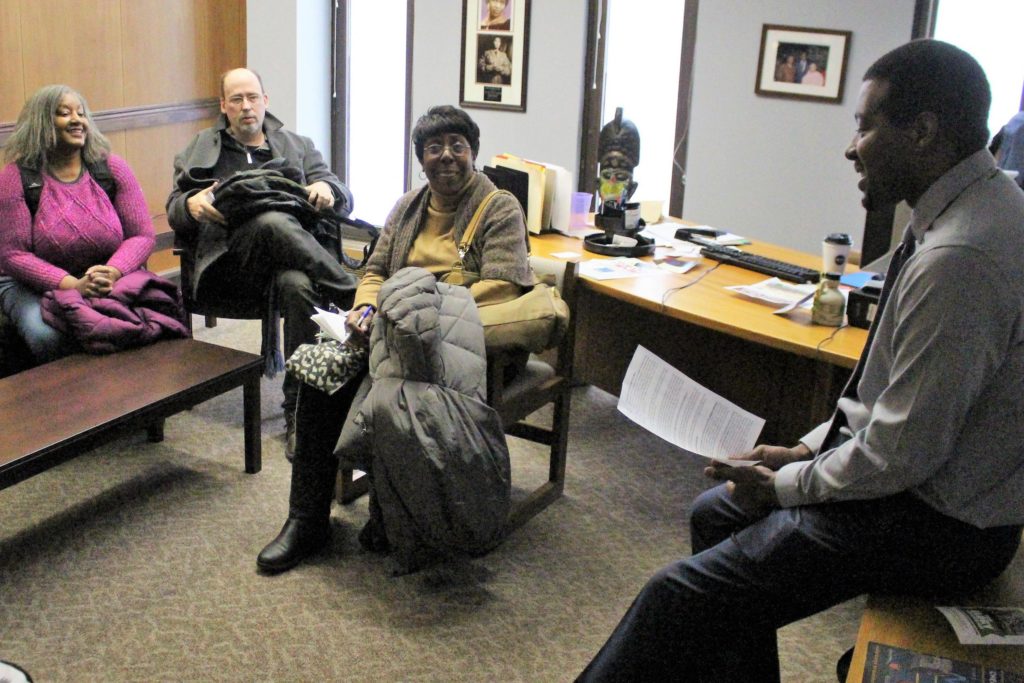
Rent reform is the hottest topic in Albany this year, and tenants activists working with the Goddard Riverside Law Project are helping to shape the conversation.
On a recent Tuesday several tenant volunteers met up before dawn at the McDonald’s on Broadway and 95th. At 7 AM they piled into a charter bus for the two-and-a-half hour trip to Albany.
Johnetter Atkins was one of those activists. She’s facing pressure to move out of her apartment on 107th Street, where she’s lived for 43 years. Atkins raised four sons there while working in the field of adoption and foster care. The neighborhood is knit into the fabric of her life.
“We know each other’s kids and grandkids,” she said. “We’ve all been there a long time.”
The Law Project supports tenants in understanding and using their rights, and provides lawyers to help them defend themselves in court. It also helps tenants share their struggles directly with lawmakers.
“We bring tenant activists to Albany at least once a year to visit their representatives,” said Larry Wood, longtime director of organizing at the Law Project. “Lawmakers and their staffs may know about the problems tenants are facing in an abstract way, but it’s a very powerful thing for them to hear directly from their constituents.”
Rent laws are in the spotlight this spring for two reasons: first, the rent stabilization law, which limits rent increases on about a million apartments in New York City, is set to expire. Second, Democrats control both the Assembly and Senate as well as the governor’s office, which activists hope will mean a tenant-friendly legislative process.
They’re pushing for an ambitious slate of changes, including:
- Allowing all towns and cities in the state to opt into rent stabilization
- Expanding rent stabilization to smaller buildings and mobile homes
- Ending the Major Capital Improvements rule, which allows landlords to hike rents permanently to pay for work done on their buildings
- Eliminating the vacancy bonus, which allows landlords an extra rent increase when a tenant moves out of a rent-stabilized apartment
- Ending vacancy decontrol, which allows apartments to be removed from the stabilization system if the rent reaches $2,733.75
- Limiting rent hikes for New York City’s 40,000 rent-controlled tenants by bringing them into the rent stabilization system
- Making “preferential rents” permanent to protect tenants from sudden, massive rent hikes
The bus pulled in next to the massive granite Capitol building after 9 AM. The tenant activists massed in a food court to review the legislative package and get their marching orders. Then they met up with other tenant groups to hold a big rally in the heart of the building. Chants of “Fight, fight, fight! Housing is a right!” bounced off the polished stone walls, putting the building on notice that tenant activists had arrived. Queens Assemblymember Andrew Hevesi reminded the crowd that the stakes are high — for a significant number of low-income tenants, eviction means homelessness.
“People have a much better life if they’re living in their own home instead of a shelter,” Hevesi pointed out. He exhorted the crowd to “keep up the pressure for the next two months” to get housing reforms into the state budget.
Smaller groups continually peeled off from the rally to go to meetings with lawmakers. Some went to legislative offices while others had impromptu meetings with lawmakers on the sidelines of the Assembly and Senate. The Law Project tenants got a warm reception from Lermond Mayes, chief of staff for Assemblymember Inez Dickens. He settled them in a large office and listened attentively while they reviewed their top priorities and shared their own experiences as renters.
Outside the tall window, the weather was enacting its own agenda. Snow fell heavily, making a pretty picture but raising concerns about the roads. As the legislature closed down early and lawmakers departed, activists headed back to their buses.
While waiting to board, longtime Goddard Riverside activist LaVera Sutton explained why she’s still fighting for tenant rights. Sutton, who works in university administration, went to court seven times over seven years to stay in her Harlem apartment. She’s experienced harassing phone calls and early-morning knocks on the door from a string of landlords. She’s had her gas, heat and electricity turned off in the dead of winter.
For the last five or six years she’s shared an uneasy peace with the building’s current owner. (“I’m terrified,” she laughs — “Why is she being so nice to me?”) But she’s never stopped educating her fellow New Yorkers about their rights.
“I speak to people every day and they all have problems with their landlords,” she said. “And what amazes me is they don’t know there are organizations there to help them.
“As many opportunities as I get — if I’m standing in the Dollar Tree, or riding the bus — I tell people about the Law Project. And I don’t plan on stopping anytime soon.”